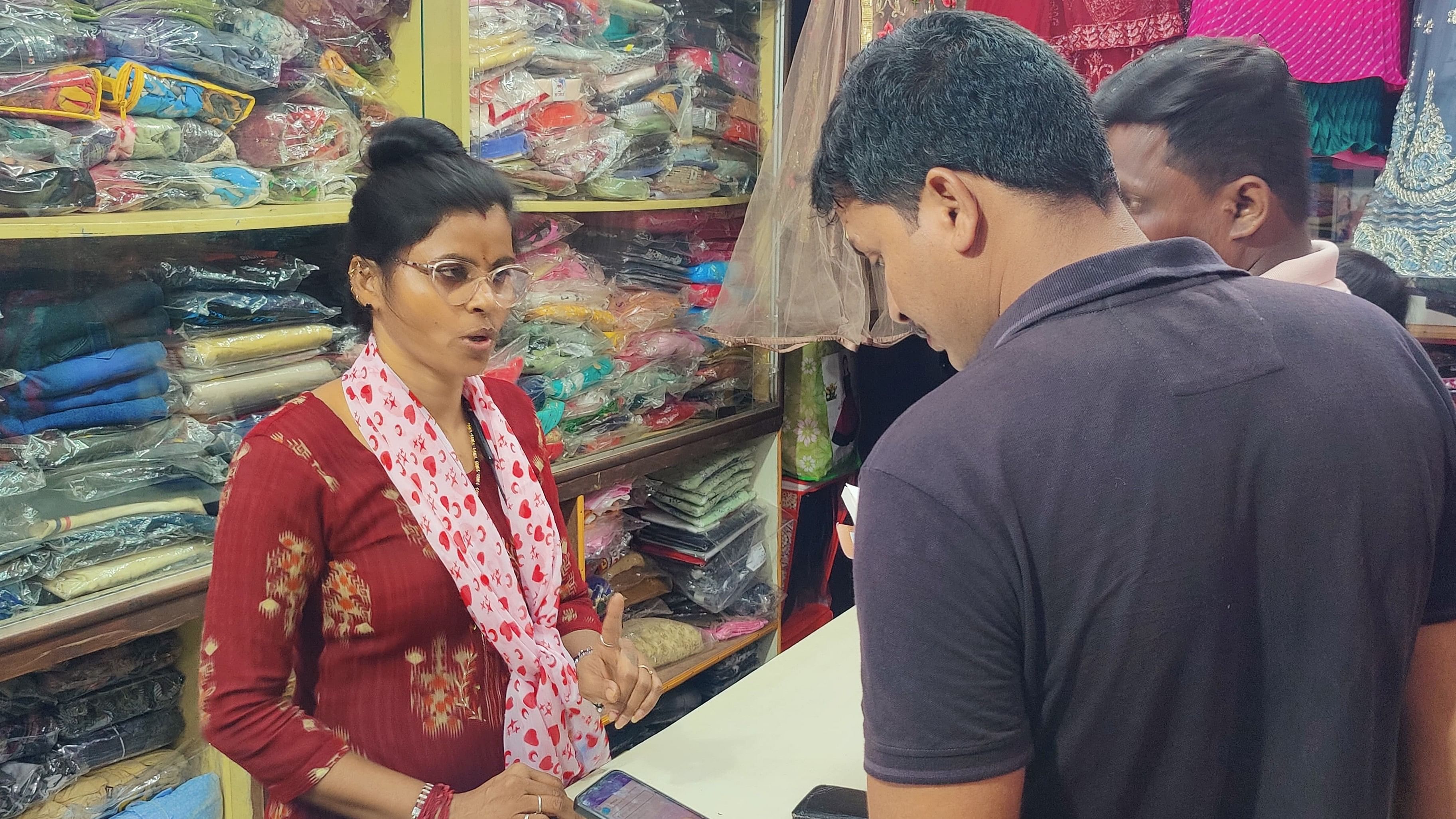
Sujatha speaks to customers at her tailoring shop.
Credit: NS Siddhartha
There was a time, two decades ago, when women from deprived communities in Mangaluru taluk could not imagine making a living without ‘beedi work’. Today, women who formerly worked as ‘beedi rollers’ are running their own businesses.
For instance, Khateeja from Ullal found it hard to afford even one square meal a day for her family of seven using her earnings from rolling beedis. It was then that Sanchi Trust, set up by the International Labour Organisation (ILO) and local NGOs presented her with a solution. She enrolled as a member of the Shivashakti self-help group, backed by ILO and DEEDS, one of the NGOs. After receiving training, she set up a pickle business using Rs 10,000 availed as a loan from Sanchi. After repaying the loan, she availed Rs 25,000 to open a shop and then a third loan of Rs 25,000 to run a ready-made cloth business.
Beedi-rolling was once central to the local economy. “Though the earnings from rolling beedis at homes was meagre, it was crucial for the survival of families,” says Umashankar Periodi, Sanchi Trust’s first president.
However, in the past two decades, families struggled financially as demand dropped. Many women also started facing multiple health issues due to their beedi-rolling work. By the late nineties, the requirements for beedi work had reduced to two or three days a week. The trade unions realised that the decline would lead to a local economic crisis.
To address this, the ILO Gender Promotion Programme, in collaboration with the Netherlands government, launched a ‘pilot project’ in traditional beedi-rolling areas in Mangaluru (Karnataka), Sagar (Madhya Pradesh), Vellore and Gudiyatham (Tamil Nadu) in August 2001.
The goal of the pilot project was to improve the living conditions of women working in the industry and promote supplemental means of income.
Discussions were held among the chief ministers of the three states and labour departments about a project that aimed to rehabilitate around 4,500 women beedi workers. The ILO, having decided on the SHG approach, collaborated with five NGOs in Mangaluru. This included the Sahodaya Bethany Seva Kendra, DEEDS, Disha Trust, Adarsha, and Chowki, which later dropped out.
By 2003, just a year after Sanchi’s launch, about 30% of women (in Mangaluru and Vellore) had been initiated into alternative income generation activities. After training, women got involved in jackfruit papad-making, tailoring, jasmine cultivation and jewellery business.
Irene Viegas of Disha Trust explains how Sanchi functions: A core group of 12 women from among the former beedi workers was trained to manage a revolving fund set up with Rs 19 lakh sanctioned by ILO.
The NGOs also had to work on interventions to change the attitude of families, the community and government officials to create a supportive environment. “Due to a history of oppression, getting women to even attend meetings outside their homes regularly was a problem initially,” recollects Umashankar.
Leena D’Costa of Sahodaya says training on banking procedures, income generation activities, workshops on rights, awareness of legal issues and government schemes were conducted to help women venture into entrepreneurship.
“Today, due to Sanchi, women are thinking beyond beedi,” says Merlyn Martis of DEEDS.
“Sanchi has helped poor women move from darkness to light and from light towards more light,” adds the joint director of the District Industries Centre, Gokuldas Nayak.
The achievements
Shambreen, the present president of Sanchi Trust, says the group is run by women, for women. Sanchi’s 12 members meet on the first Tuesday of every month at the DEEDS office in Shivabagh to sanction fresh loans, track loan repayment and review the monthly plan.
A book on the success stories of women beedi workers, ‘Beediyinda paryaya udhyamadattha’, was published by Sahodaya Bethany Seva Kendra in 2001. The second edition was published recently. Gulabi Bulimale authored this collection, titled ‘Sanchiyalli aralida huvugalu’.
Gulabi says that 1,072 women have availed Sanchi loans worth Rs 5.5 crore. "Nearly 45% of the loans were given to women who have ventured into dairy farming and tailoring. "Sanchi now has a revolving fund to the tune of Rs 33 lakh," says Merlyn.
The former beedi workers, with their newfound identity as entrepreneurs, have also been able to bring their problems to the notice of the government and avail loans for the education of their daughters. Sanchi’s example provides a good model to protect the livelihoods and health of industries undergoing major upheavals, according to the ILO.
Now, the trust also aids women from various backgrounds and occupations. For instance, Sujatha, a woman from the Lambani community was facing severe financial hardship. Through loans from Sanchi, Sujatha was able to set up her own shop, Shri Bhavani Ladies Tailors and Textiles in Lingapayyana Kadu, and now supports her family.